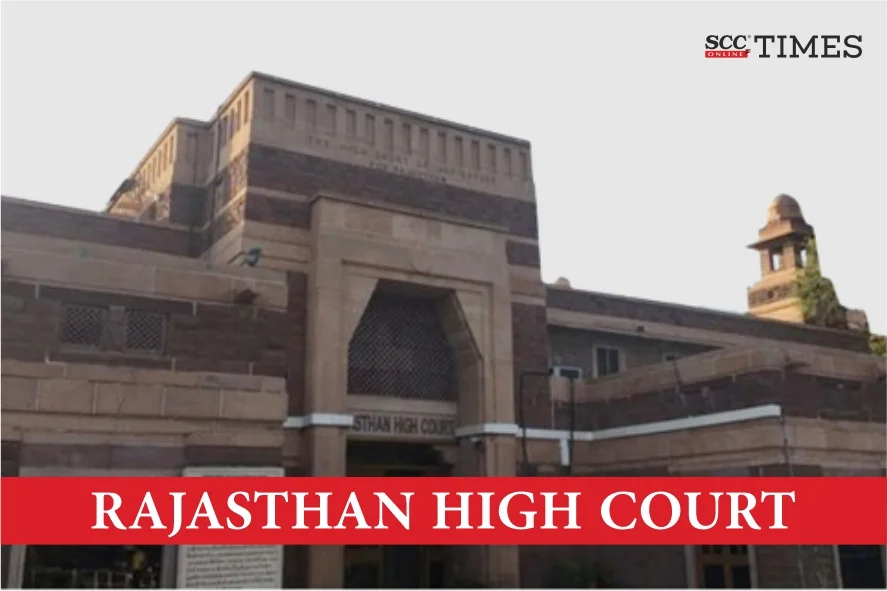Rajasthan High Court: In an important case on rights of youth in Shelter Homes originating from a letter dated 20-05-2025 written by children residing at Balika Grah, Alwar, raising serious grievances regarding non-receipt of grant-in-aid and alleged exploitation by certain officials, a single-judge bench of Anoop Kumar Dhand, J., deeply disturbed by the plight of these children, recognised the larger systemic issues faced by care leavers in India and treated the letter as a public interest litigation. The Court issued a series of comprehensive and structural directives, forming a framework to address the challenges faced by Care Leavers.
The Court noted that the instant matter goes beyond the immediate concerns of the Balika Grah residents and expands to address the systemic failures impacting thousands of youth aging out of Child Care Institutions (CCIs) who, upon attaining adulthood at 18, are “thrust into the outside world” without essential identity documents, housing, or support systems. The Court painfully observed that —
“Thousands of youth, individuals who, after growing up in CCIs, are thrust into the outside world upon turning 18… step into adulthood without a stable identity, permanent address, shelter or a support system to rely upon. Such individuals are known as ‘Care Leavers’.”
The Court emphasised on the State’s constitutional, statutory and moral obligations which extends beyond the age of 18 for children raised in CCIs. The Court noted that, despite the constitutional guarantees under Articles 15, 21, and 39 of the Constitution of India, and the existence of legislative measures such as the Juvenile Justice (Care and Protection of Children) Act, 2015, the implementation on the ground remains dismal.
The Court highlighted that the vulnerability of these Care Leavers is not due to a lack of potential, but a lack of institutional support. The Court took judicial notice of surveys revealing that — 40% had no proof of residence, 64% lacked voter cards, 54% had no PAN cards, and over half were unemployed. The Court noted that while 93% of those who received vocational training retained employment, the absence of a structured system leads most to fall into cycles of poverty, exploitation, or crime.
The Court painted a sobering picture of the plight of care leavers, where they lack legal identity documents, which makes them ineligible for schemes, employment, or education, many are pushed into low-wage work, homelessness, crime, or trafficking and absence of psychosocial support, mentors, and formal transitional housing leads to emotional distress and marginalization.
The Court acknowledged the resilience and potential of care leavers and stated “their voices must be heard… Policymakers must act.” The Court asserted that “by investing in Care Leavers today, we not only be able to fulfill our social responsibility but also able to build a stronger & more inclusive future for all.”
The Court issued a series of comprehensive and structural directives, forming a framework to address the challenges faced by Care Leavers —
- Directed the letter to be registered as a Public Interest Litigation titled Suo Motu: In Re: In the matter of Grievance of the Girls staying in Balika Grah and Care Leavers fighting for their identity and rights after leaving shelter homes.
- Issued notice to 10 respondents including the Union of India, Chief Secretary and relevant Departments of the State Government, District Collector and UNICEF Rajasthan, among others.
- Directed the District Collector, Alwar, and Secretary, District Legal Services Authority, Alwar to inspect Balika Grah, record statements of children and staff, inquire into grant-in-aid issues, and ensure no abuse (physical or emotional) takes place.
- Proposed eight foundational pillars of policy intervention —
- Financial Empowerment: Monthly stipends, vocational training, entrepreneurship support, and emergency funds.
- Universal Access to Legal Identity: Mandatory issuance of Aadhaar, PAN, voter ID, etc., before leaving the institution.
- Life Skills Training: Programs on budgeting, cooking, public transport, health systems, digital literacy and mentorship from professionals and older care leavers.
- Housing Support: Transitional housing with mentorship, State-supported rental accommodations schemes, and appointment of dedicated nodal officers.
- Mental Health Care: Trauma-informed services, peer networks, and mental health professionals in aftercare systems.
- Tax Exemptions: Dedicated tax exemptions up to age 25 or for 5 years post-care, deductions for education, rent, health insurance and TDS relief, employer incentives, and GST waivers.
- Technology and Data: Creation of centralized digital platforms and databases for tracking and supporting Care Leavers.
- Policy Reform: Real-time, consent-based databases, uniform SOPs, interlinking with welfare schemes, and enabling access.
- Directed the Union of India and the State of Rajasthan to submit detailed reports on steps taken.
- Directed to send the copies of the order to relevant authorities for compliance.
-
Directed the office to place the matter before Chief Justice for appropriate listing.
[In the matter of “Grievance of Girls staying at Balika Grah and Care Leavers fighting for their Identity and Rights after leaving Shelter Homes”, In re, 2025 SCC OnLine Raj 2552, Decided on 30-05-2025]



